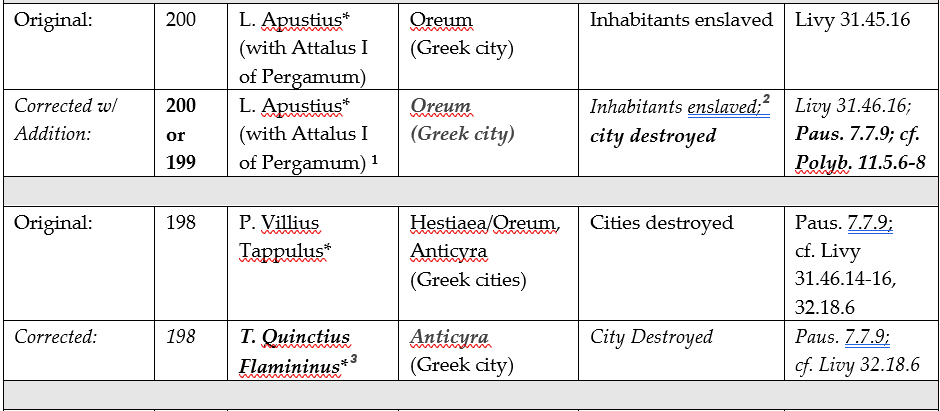Spare No Errors
Since publishing Spare No One in winter 2020/21, I’ve spotted a few minor errors in the published text. (Note: These are entirely due to my carelessness, and are not the fault of my excellent editors.) I’ve also found a couple of things I’d like to change and a few notes I’d like to add. So, without further ado, I’m going to use this space to list errors, notes, and additions as I come by them.
Main Text: Corrections & Additions
Page 44: “They and the Romans agreed to a ransom price, but only 13,000 people were able to pay and walk free. The remaining 12,000 could not scrape together the money, and the Roman commander sold them as slaves…” “…like the 12,000 unfortunates at Panormus…”
- Correction: “but only 14,000 people were able to pay and walk free. The remaining 13,000 could not scrape together the money, and the Roman commander sold them as slaves…” “…like the 13,000 unfortunates at Panormus…”
/ /
Page 100: “The Romans also beat and beheaded seventy of their leading men.”
- Correction: “The Romans also beat and beheaded seventeen of their leading men.”
/
Page 110: “…as were coin hordes that were never collected…”
- Correction: “…as were coin hoards that were never collected…”
/
Page 166: “In 195, the consul Marcus Porcius Cato reportedly destroyed the walls of every town east of the Baetis (Guadalquivir) River in Spain.”
- Correction: “In 195, the consul Marcus Porcius Cato reportedly destroyed the walls of many towns around the Ebro River in Spain.”
- Note: Polybius (19.1.1 = Plut. Cat. Mai. 10) states that Cato destroyed the walls of the towns ἐντὸς Βαίτιος ποταμοῦ (the source of my original mistake), but this is probably an error on his part or Plutarch’s, since Roman control did not yet extend that far into Spain. For discussion, see Walbank 1979, 63, and Knapp 1980, 37.
/
Correction: Pages 2, 16n.6, 74, 212n.11: the translations from Diodorus Book 32 are by F.R. Walton (from the Loeb Classical Library edition), not C. H. Oldfather.
/
Appendix 1 – Corrections and Additions




¹ Pausanias says that one “Otilius” (probably P. Villius Tappulus, cos. 199) destroyed Hestiaea/Oreum; however, Livy (following Polybius) has Apustius capturing Oreum.
² Polybius (11.5.6-8) has Thrasycrates criticizing the Aetolians for making an alliance with Rome, in part because the Romans burn cities and enslave free Greeks. To underline his point, he mentions both Aegina (where the inhabitants were sold: Polyb. 22.8.9-10) and Oreum, suggesting that the two cities shared the same fate.
³ Pausanias says that one “Otilius” (probably P. Villius Tappulus, cos. 199) destroyed Anticyra; however, Livy (following Polybius) has Flamininus capturing Anticyra.
/
Appendix 2 – Corrections and Additions
